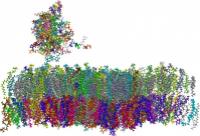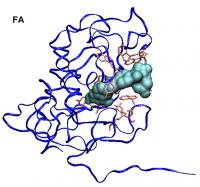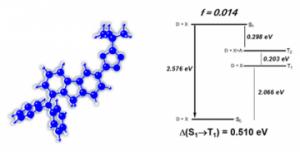Schedule of classes for the academic year 2024/2025
Coordinator: Prof. Dr. Anela Ivanova
Faculty of Chemistry and Pharmacy, 1 James Bourchier Blvd.
1164 Sofia, Bulgaria
Office 524
Phone: 02/8161 520
E-mail: aivanova@chem.uni-sofia.bg
Form of study: full-time
Duration of study (number of semesters): three
CURRICULUM FROM 2014/2015 TILL 2017/2018
CURRICULUM FROM 2018/2019 TILL 2021/2022
Synopsis of the programme
Computational Chemistry is a modern branch of natural sciences. It is utilized either to supplement experimental data or to explain or predict new chemical or physical phenomena. Its main implementations are for design of new compounds, supramolecular assemblies, materials, prediction of new properties, and interpretation of experimental findings. Molecular modelling can be used as the first step of creating new materials with predefined optical, magnetic, conductive, or other characteristics. Computations are indispensable nowadays also when deciphering the mechanisms of complex biochemical processes in living organisms.
The main focus of the M. Sc. programme is on the study, understanding, and application of the methods for molecular modelling. They consist of quantum chemistry of molecules and more complex systems (crystals and nanostructures), molecular mechanics, QM/MM approaches, molecular dynamics and Monte Carlo algorithms, QSAR, and computational spectroscopy. Programming is also included as a basic tool for software development to perform the calculations or to analyse data. Both the basics of the methods and the recent developments are taught. All courses have practical exercises for illustration of the material from the lectures and for mastering the use of professional software packages. The students model and interpret at the molecular level the properties of different moieties – organic, inorganic, or hybrid.
The programme is completed within 3 semesters, the first two containing most of the study courses. The third semester is intended primarily for a research practicum and completion of the M. Sc. Thesis. The education complies with all EU requirements, including the ECTS. All courses and training are in English.
Elective and optional courses
Students are allowed to elect extracurricular courses during the entire study. A minimum of one elective is required. Courses can be selected from those offered within the M. Sc. programmes at the Faculty of Chemistry and Pharmacy or at other faculties of Sofia University. This provides the opportunity for specializing in an area of interest of each student.
Teachers
The lecturers of all disciplines are specialists in the respective research field. Most of them come from Sofia University but also some external teachers are invited.
Teachers: Prof. Anela Ivanova, Prof. Alia Tadjer, Prof. Todor Dudev, Prof. Galia Madjarova, Prof. Petko Petkov, Prof. Hristiyan Aleksandrov, Prof. Ivanka Tsakovska (BAS), Dr. Yasen Velkov (experienced software developer), Assoc. Prof. Julia Romanova, Assoc. Prof. Iskra Koleva, Assist. Prof. Jasmina Petkova, Assist. Prof. Hristo Rasheev, invited lecturers
Personal work with the students is adopted. Each student is given the chance to develop specific skills. Most of the disciplines offer individual assignments to each student during the practicums.
Auditoria and labs
Lectures are taught in the auditoria of the Faculty of Chemistry and Pharmacy and BAS equipped with the necessary multimedia tools. Practicums are carried out in specialized computer labs where a personal terminal is allocated to each student. Some of the calculations are submitted to multiprocessor server clusters. The professional software packages are licensed accordingly.
Career opportunities
The graduate Masters of Computational Chemistry may pursue career in the pharmaceutical and chemical industry, in organizations working on environmental protection or health, design of materials for nanotechnology, clean energy, as IT specialists, as data management or data processing scientists, in the academia, and in many other areas worldwide. The training provided within the programme enables also continuation of the education in a PhD programme at a high-level university. All graduates of the programme are valued specialists in their occupation.
The current occupation of all students in the programme are summarized in the table below.
| Country | PhD students | Academia | IT sector | Health | Industry | Misc. |
| Bulgaria | 6 | 12 | 5 | 5 | 6 | 5 |
| Germany | 1 | 1 | 2 | 2 | ||
| Sweden | 2 | |||||
| UK | 1 | 1 | ||||
| France | 3 | |||||
| Italy | 1 | |||||
| Spain | 1 | 1 | ||||
| Canada | 1 | |||||
| USA | 1 |
Admission requirements
The M. Sc. programme is open to a wide range of applicants who hold B. Sc. degree in all branches of Chemistry (incl. Computational Chemistry), Pharmacy, Biology, Physics, IT, Mathematics, or another major related to the profile of the programme. More details on the admission procedure can be found here.
Still not clear? Contact us!
What do some of our alumni think about the programme?
• Dr. Alexander Kantardjiev • Prof. Hristiyan Aleksandrov • Dr. Martin Gotsev • Prof. Vihar Georgiev • Dr. Tsveta Miteva • Dr. Silvya Ninova • Dr. Alexander Mehandjiiski • Dr. Yana Tsoneva • Dr. Deyan Raychev • Assist. Prof. Nina Ilieva • Dr. Fatmegyul Mustan • Dr. Georgi Stoychev • Rossen Monov • Assist. Prof. Hristo Rasheev • Stoyan Iliev • Eduarda Encheva • Marianna Vasilaki • Chara Borislavova • Georgi Vassilev
Topics for research work and diploma theses
All teachers are active researchers who also participate in international collaborations all over the world. Students have the opportunity to perform research within these projects both in Bulgaria and abroad. Some of the current topics are:
- Study of folate and antifolates as ligands for targeted drug delivery of doxorubicin
Classical molecular dynamics and quantum chemical simulations of models ranging from a single molecule to supramolecular constructs of 104 molecules aimed at elucidating the specificity of binding of the ligands to a membrane-embedded folate receptor-a and to understanding the mechanism of recognition at the molecular level
|
|
|
- Design of organic TADF blue emitters for OLEDs
Quantum chemical modelling of new molecules able to emit intensively blue light focused on improving the emission efficiency by making use of thermally activated delayed fluorescence (TADF)
- Electronic structure of organic conducting polymers
Ab initio electron-correlated study of the excited states and of the optical properties of polyaniline oligomers in their conducting state focused on correct theoretical description of this complex polymer at the molecular level and on interpretation of its diverse spectral characteristics
You like a topic? Contact us!






